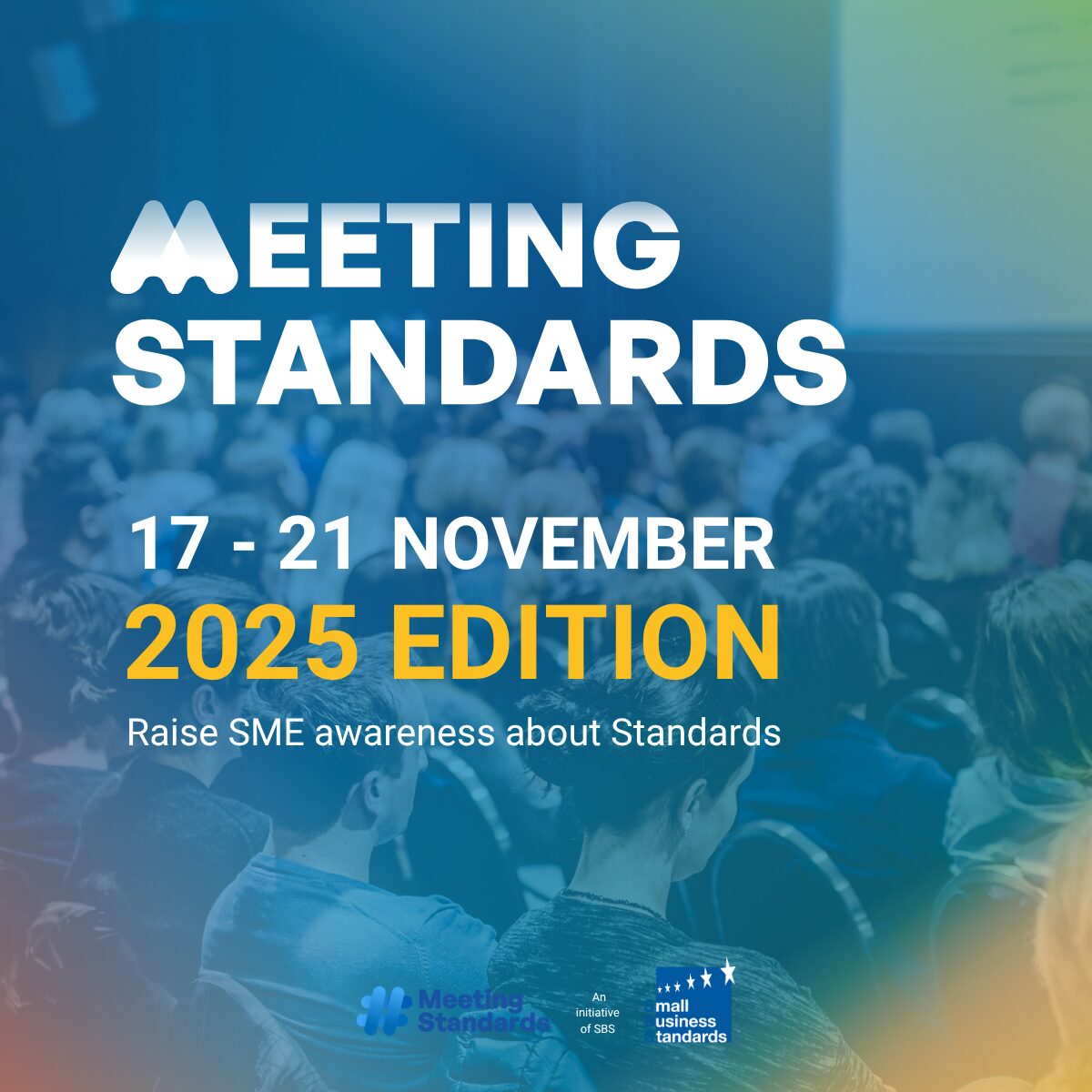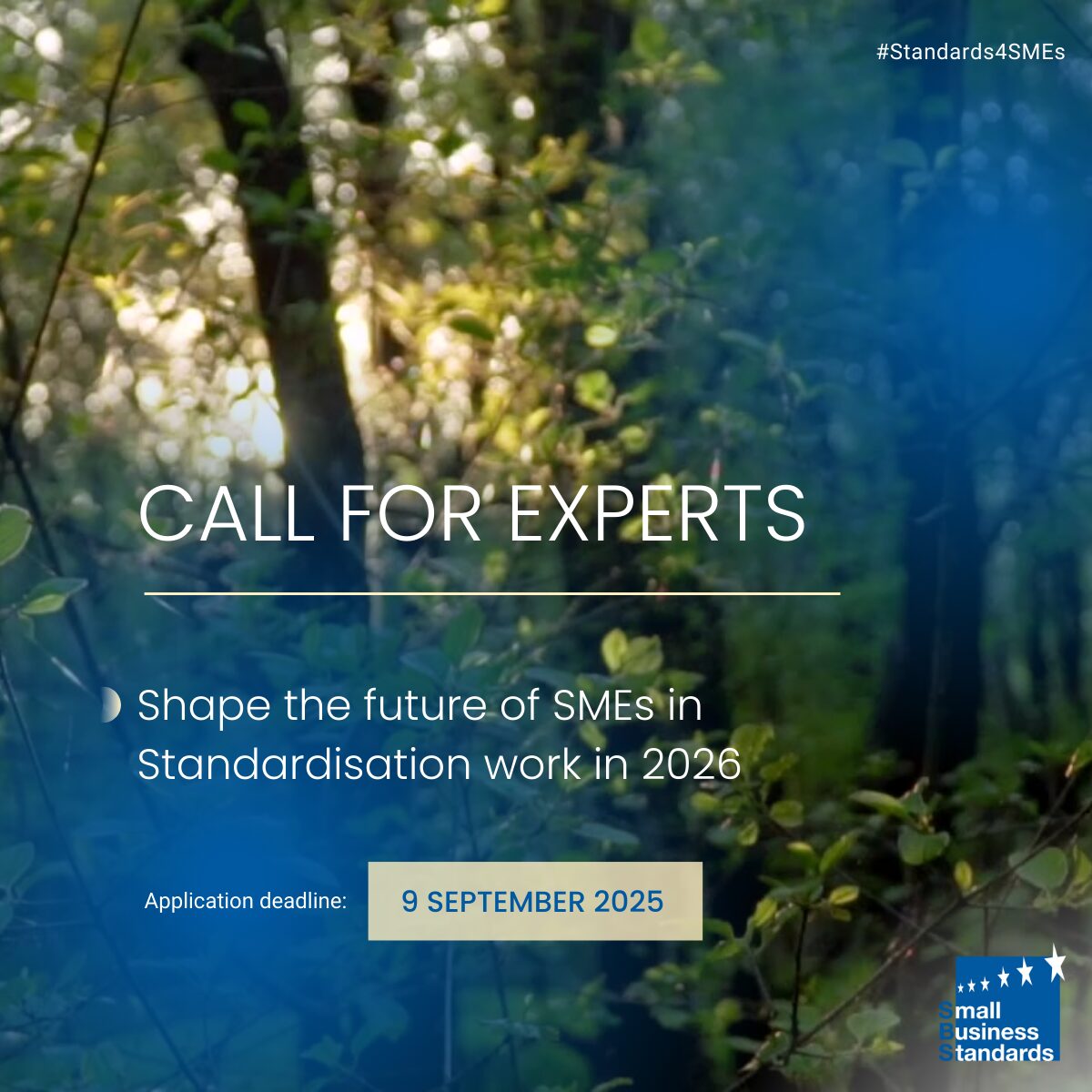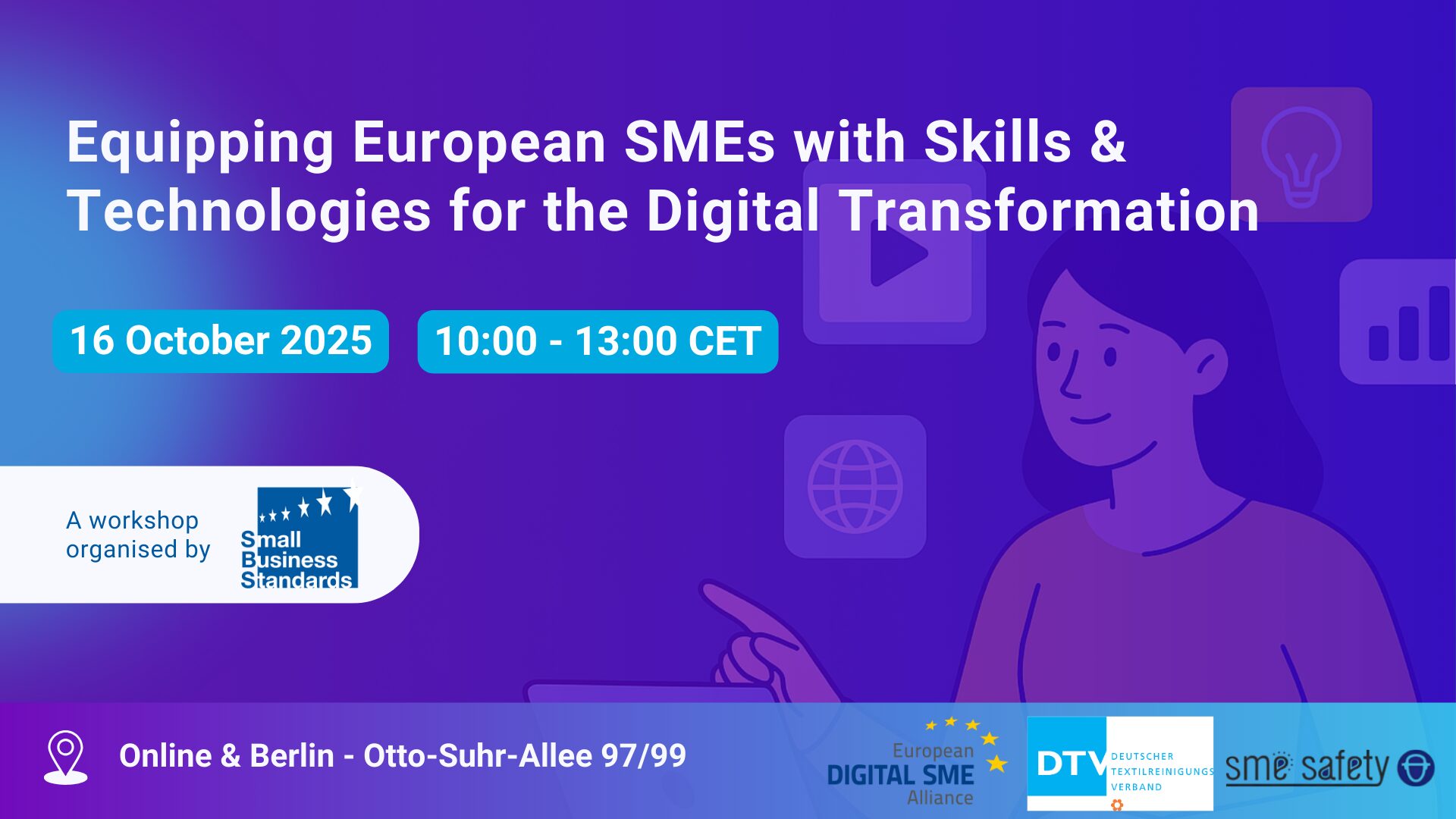Digitalisation
Discover the SBS activities in support of the digital transition and how we support SMEs navigating through Information and Communication Technologies (ICT) standardisation and in the implementation of relevant standards.
Standards can facilitate SMEs’ digital transition by providing frameworks and guidelines for technology adoption, interoperability, cybersecurity, and data management, ensuring smoother integration into digital ecosystems and enhancing competitiveness.
In the area of digitalisation, SBS covers a wide range of topics dealing with Information and Communication Technologies (ICT) standardisation and related European policies and legislation.
On the policy side, SBS pursues several avenues for action. It produces position papers to uphold the views and interests of European SMEs on relevant European legislation and policies in areas such as cybersecurity, Artificial Intelligence or the data economy. SBS is also an active participant in European Commission fora and Expert Groups like the European Multi-stakeholder Platform (MSP) on ICT Standardisation, responsible for the development of the European Commission Rolling Plan on ICT Standardisation, or the Commission Expert Group on Radio Equipment.
On the technical side, each year SBS nominates and funds experts that actively shape the development of European and international standards on topics ranging from Artificial Intelligence to cybersecurity, digital identity, the Internet of Things or blockchain technologies. Our experts in CEN, CENELEC, ETSI, ISO and IEC work each year on many different work items and draft standardisation deliverables in the ICT field to ensure these standards and other documents meet SME needs and characteristics.
To ensure coordination between the SBS members and experts, SBS created a Digitalisation Working Group as a platform for discussion and exchange and to agree on SBS’ positions on relevant policy and technical issues concerning digitalisation.
SBS supports the implementation of existing standards, by offering free implementation guides and learning materials to help SMEs confidently approach the world of standardisation.
In the area of digitalisation, SBS covers a wide range of topics dealing with Information and Communication Technologies (ICT) standardisation and related European policies and legislation.
On the policy side, SBS pursues several avenues for action. It produces position papers to uphold the views and interests of European SMEs on relevant European legislation and policies in areas such as cybersecurity, Artificial Intelligence or the data economy. SBS is also an active participant in European Commission fora and Expert Groups like the European Multi-stakeholder Platform (MSP) on ICT Standardisation, responsible for the development of the European Commission Rolling Plan on ICT Standardisation, or the Commission Expert Group on Radio Equipment.
On the technical side, each year SBS nominates and funds experts that actively shape the development of European and international standards on topics ranging from Artificial Intelligence to cybersecurity, digital identity, the Internet of Things or blockchain technologies. Our experts in CEN, CENELEC, ETSI, ISO and IEC work each year on many different work items and draft standardisation deliverables in the ICT field to ensure these standards and other documents meet SME needs and characteristics.
Kris
ISO TC 261
Additive manufacturing
Kris
ISO TC 261 WG 2
Additive manufacturing / Processes, systems and materials
Haenisch
Jochen
ISO TC 184 / SC 4
Automation systems and integration/Industrial data
Haenisch
Jochen
ISO TC 184 / SC 4 / WG 12
Automation systems and integration/Industrial data / STEP product modelling and resources
Haenisch
Jochen
Automation systems and integration/Industrial data / SMRL Validation Team
Karamotchev
Petko
ISO TC 307
Blockchain and distributed ledger technologies
Karamotchev
Petko
ISO TC 307 + WG 6
Blockchain and distributed ledger technologies / Use cases
Suarez
Belen
ISO/TC 307 / WG 5
Use cases and applications
Tantar
Emilia
ISO/IEC JTC 1 / SC 42/WG 4
Use cases and applications
Tantar
Emilia
ISO/IEC JTC 1 / SC 42
Artificial Intelligence
Tantar
Emilia
CEN-CENELEC JTC 21/WG 2
Artificial Intelligence / Operational aspects
Tantar
Emilia
CEN-CENELEC JTC 21
Artificial Intelligence
Massimo
Fabio
ISO/IEC JTC 1 / SC 7
Software and systems engineering e
Massimo
Fabio
ISO/IEC JTC 1 / SC 7 / WG 24
SSoftware and systems engineering / Software and systems bodies of knowledge and professionalization
Massimo
Fabio
CEN TC 428
ICT Professionalism and Digital Competences
Massimo
Fabio
Competence, skills, knowledge and roles
Massimo
Fabio
Quality, Strategy and Outreach
Vanetti
Massimo
Allard
Jean-Luc
ISO/IEC JTC 1 / SC 27 WG 4
Information Technology/ Information security, cybersecurity and privacy protection / Security controls and services
Allard
Jean-Luc
ISO/IEC JTC 1 / SC 27
Information security, cybersecurity and privacy protection
Caccia
Andrea
ETSI TC ESI
Electronic signatures and infrastructures
Caccia
Andrea
CEN TC 224
Personal identification and related personal devices with secure element, systems, operations and privacy in a multi sectorial environment
Caccia
Andrea
CEN TC 224 WG 17
Protection Profiles in the context of SSCD
Caccia
Andrea
CEN TC 224/WG 20
Ad Hoc Group on European Digital Identity Wallets
Giribaldi
Davide
ISO/IEC JTC 1/SC 27/WG 5
Identity management and privacy technologies
Guasconi
Fabio
ISO/IEC JTC 1 / SC 27 / WG 1
Information Technology/Information security, cybersecurity and privacy protection/Information security management systems
Guasconi
Fabio
CEN CLC JTC 13/WG 5
Data Protection, Privacy and Identity Management
Guasconi
Fabio
Information security management systems
Iacchetti
Rocco
CEN-CENELEC JTC 13/WG 2
Management systems and controls sets
Iacchetti
Rocco
Product security
Sharkov
George
ETSI TC CYBER
Cybersecurity
Sharkov
George
Industry Specification Group Securing Artificial Intelligence
Suarez
Belen
ISO/TC 279
Innovation management
Suarez
Belen
ISO/TC 279/ WG 1
| Innovation management system |
Suarez
Belen
Tools and methods
de Michelis di Slonghello
Isabella
ISO/IEC JTC1/SC 35
User Interfaces
de Michelis di Slonghello
Isabella
Graphical user interface and interaction
Babinov
Georgi
ISO/IEC JTC 1 WG 11
Information Technology/Smart cities
Babinov
Georgi
ETSI TC ATTM
Access, terminals, transmission and multiplexing
Babinov
Georgi
ETSI TC ATTM / WG AT2
Access, terminals, transmission and multiplexing / Infrastructure, Physical Networks & Communication Systems
Babinov
Georgi
ETSI TC ATTM / WG SDMC
Access, terminals, transmission and multiplexing / Sustainable Digital Multiservice Communities
Babinov
Georgi
ETSI TC ATTM / WG TM6
Digital access transmission systems
Valente
Paolo
ISO/TC 268/SC1
Smart community infrastructures
Valente
Paolo
ISO/TC 268/SC 1/WG2
Integration and interaction framework for smart community infrastructures
Bertani
Sebastiano
ETSI TC RRS
Reconfigurable Radio Systems
Bertani
Sebastiano
CEN/CENELEC JTC 13/WG 8
Caccia
Andrea
CEN/TC 468
Management and preservation of digital content
Caccia
Andrea
CEN/TC 468/WG1
General concepts for preservation of digital information
Posca
Emilio
ETSI TC EE
Environmental Engineering
Posca
Emilio
ETSI TC EE/ WG EE1
Posca
Emilio
ETSI TC EE/ WG EE2
Posca
Emilio
ETSI TC EE/ WG EEPS
Related

NEWS | Joint Proposal for a new Assessment and Verification System (AVS 4+)
Small Business Standards (SBS), EuroWindoor, European Aluminium, EPPA and Glass for Europe have jointly submitted a proposal for the introduction of a new Assessment and

NEWS | Joint Proposal for a new Assessment and Verification System (AVS 4+)
Small Business Standards (SBS), EuroWindoor, European Aluminium, EPPA and Glass for Europe have jointly submitted

Meeting Standards Week 2025 | 600 000 people reached this year
We are thrilled to share the extraordinary impact of the third edition of our Meeting

Meeting Standards Week 2025 | Discover the events
The third edition of Meeting Standards has started! This awareness-raising initiative dedicated to empowering SMEs

Recording | Info Session Call For Experts 2026
Small Business Standards (SBS) has launched an open call for experts to represent SME interests
SME GUIDE | Implementation of ISO/IEC 27001:2022 on Information Security Management
In the framework of the EU-funded actions for support to SMEs in standardisation by Small Business Standards, the European DIGITAL SME Alliance developed and now
SBS Reply to the Consultation on rules for DPP Service Providers
SBS published its reply to the European Commission’s Consultation on rules for Digital Product Passport

SBS reply to Call for Evidence on Digital product passport – rules for service providers
In December 2024, SBS responded to the Commission’s Call for Evidence on Digital product passport


SBS Workshop | Equipping European SMEs with Skills & Technologies for the Digital Transformation
Small Business Standards Workshop: Equipping European SMEs with Skills & Technologies for the Digital Transformation 16 October 2025 | 10:00 – 13:00 Hybrid: Otto-Suhr-Allee 97/99,

SBS Workshop | Equipping European SMEs with Skills & Technologies for the Digital Transformation
Small Business Standards Workshop: Equipping European SMEs with Skills & Technologies for the Digital Transformation
SBS Workshop | Digital Skills for the Digital Transformation of the PPE, Textile Care, and Medical Devices Sectors
We are pleased to invite you to our upcoming Small Business Standards Workshop on “Digital

SMEs And Smart Manufacturing – Standards As Accelerators Of Industry Change
Meeting Standards is a campaign to raise awareness among SMEs and SME organisations about the importance of Standardisation and getting involved in the standards writing process.

How to ensure the Digital Product Passport empowers SMEs
On 21 June, SBS organised a hybrid workshop to explore the potential impact of the Digital Product Passport (DPP) on SMEs.



























